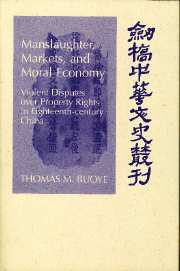 Manslaughter, Markets, and Moral Economy
Manslaughter, Markets, and Moral Economy Book contents
- Frontmatter
- Contents
- List of Maps, Figures, and Tables
- List of Qing Dynasty Emperors' Reign Dates
- List of Weights and Measures
- Acknowledgments
- Introduction
- 1 Economic Change, Social Conflict, and Property Rights
- 2 “Population Increases Daily”: Economic Change during the Eighteenth Century
- 3 “As Before Each Manage Their Own Property”: Boundary and Water-rights Disputes
- 4 “Crafty and Obdurate Tenants”: Redemption, Rent Defaults, and Evictions
- 5 Temporal and Geographic Distributions of Property-rights Disputes in Guangdong
- 6 Violence North, West, and South: Property-rights Disputes in Shandong, Sichuan, and Guangdong
- 7 “You Will Be Rich but Not Benevolent”: Changing Concepts of Legitimacy and Violent Disputes
- 8 Conclusion
- Appendix
- Bibliography
- Index
2 - “Population Increases Daily”: Economic Change during the Eighteenth Century
Published online by Cambridge University Press: 28 October 2009
- Frontmatter
- Contents
- List of Maps, Figures, and Tables
- List of Qing Dynasty Emperors' Reign Dates
- List of Weights and Measures
- Acknowledgments
- Introduction
- 1 Economic Change, Social Conflict, and Property Rights
- 2 “Population Increases Daily”: Economic Change during the Eighteenth Century
- 3 “As Before Each Manage Their Own Property”: Boundary and Water-rights Disputes
- 4 “Crafty and Obdurate Tenants”: Redemption, Rent Defaults, and Evictions
- 5 Temporal and Geographic Distributions of Property-rights Disputes in Guangdong
- 6 Violence North, West, and South: Property-rights Disputes in Shandong, Sichuan, and Guangdong
- 7 “You Will Be Rich but Not Benevolent”: Changing Concepts of Legitimacy and Violent Disputes
- 8 Conclusion
- Appendix
- Bibliography
- Index
Summary
Before examining violent disputes over property rights in detail, it is necessary to delineate their political, social, and economic contexts. In 1644, Manchu troops, with the collaboration of Chinese armies of the crippled Ming dynasty (1368–1644), entered Beijing and established the Qing dynasty. Fighting between rebel peasant armies and government troops had left large areas of China devastated in the closing years of the Ming dynasty and it took the Manchu rulers four decades to consolidate their control. During that time the Qing armies successively quelled persistent peasant uprisings; eradicated the last remnants of Ming loyalist forces in southern China; and suppressed the Sanfan Rebellion, a challenge from their erstwhile Chinese collaborators. When the fighting ended in 1683, a period of recovery ensued and created the foundation for over a century of political stability. Historians have eloquently described the grand achievements of this unprecedented era of peace and sustained economic and territorial expansion known as the “High Qing.” Beneath the surface, in the realm of the “little tradition,” however, the broad economic changes of the eighteenth century were engendering tensions that sometimes erupted into violent disputes.
Politically, the Manchu conquerors implemented several important institutional innovations designed to safeguard the power of the alien minority. For example, the Banner Military System supplied a reliable and loyal armed force. The Court of Colonial Affairs (Lifan Yuan) handled diplomatic relations between the court and non-Han peoples on the northwestern frontiers. The Grand Council consolidated several central-government agencies under the emperor's direct control, checking the power of the overwhelming Han Chinese bureaucracy.
- Type
- Chapter
- Information
- Manslaughter, Markets, and Moral EconomyViolent Disputes over Property Rights in Eighteenth-Century China, pp. 34 - 70Publisher: Cambridge University PressPrint publication year: 2000


